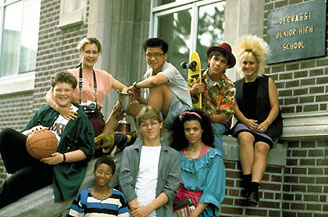Chapter Two: Eh, Canada
By Brett Ballard-Beach
December 29, 2011
I think his greatest consecutive stretch of writing occurred in the mid-to-late ‘90s and involved the short story collection Life After God (1994), the nonfiction essay/pictorial Polaroids from the Dead (1996) and the Silicon Valley satire Microserfs (1995). Life After God in particular is a deeply moving series of mini-portraits of the loss of (and search for) spirituality among a generation struggling to create their own faith. Coupland is among the most emotionally sincere (that word again) of writers which is the element that always pulls me back in again, but he can strand his stories in off-putting apocalyptic violence/visions, purple prose, and narrative gambits that don’t hold up to repeated readings. I can think of no other current writer who both moves me and exasperates me in fairly equal measures.
And yet when I click with his point of view, it opens up a world of feelings and insight that I don’t experience with many other writers. Such a connection is innate with the Souvenir of Canada series (non-fiction seems to either open up a side of him that fiction keeps repressed, or it simply allows unfettered access to those traits of his writing and personality of that are the most meaningful for me.) Both installments of Souvenir of Canada could have easily wandered into lowest common denominator jingoism and celebrations of nationhood padded out with a lot of (very engaging) photos. Organized from A to Z, each book contains about 144 pages and 60 “chapters” - a word or phrase followed by a written essay of a few sentences or a couple of pages (complete with visual accompaniment) that literally or emotionally captures/defines/encapsulates the word or phrase. But as Coupland himself states, and his even-handed writing bears him out, he comes neither to praise Canada unequivocally nor to bury it, but to examine with a clear eye Canada’s fairly unconventional history, its long road to nation status, and what it has to offer to its citizens. For visitors to the country, he hopes that the books would serve as a “very personal x-ray of Canada.” (He also confirms that it’s perfectly fine to use the word Canuck, which is reassuring since I could never imagine giving it up.)
What Coupland most effectively conveys, through the anecdotes that involve travel (by train, plane, car, boat, or foot), or the consideration of time zones, is the vastness of his homeland, particularly in the northern areas that still remain relatively unpopulated/uninhabitable. He shadows a convincing portrait of the type of personality it took to survive in those climes in the early 20th century, or at least before the communication advances of the last several decades have helped to bridge that distance considerably. He uses this strategy to similar effect in his most recent work, a quirky, engaging, and quite unconventional biography on culture theorist Marshall McLuhan, amusingly given the in-joke title “You Know Nothing of My Work” in markets outside of Canada.
There isn’t very much that distinguishes Souvenir of Canada 2 from the first. It is still enjoyable, though at times it has the feel of an unnecessary sequel rushed into production to strike while the iron is hot. The centerpiece (pages 40-70) is an art installation, titled Canada House, in which Coupland was allowed to create a representation of the country through cultural artifacts, furniture, and found objects arranged and photographed in a house slated to be torn down, kind of like Burn to Shine with art instead of bands.
Continued:
1
2
3
4
5
|
|
|
|




